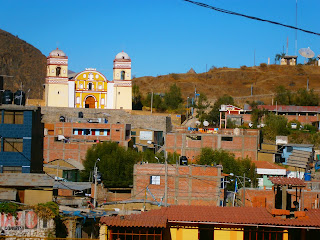Wow, so much has happened in the past few days I can
hardly believe it!
All of the health volunteers (about 30) were taken way up
into the mountains of the Huancavelica region of Peru, southeast of Lima for
field-based training exercises. We had a
lovely drive along the coast and then we ascended thousands of feet on
switchback roads into the Andes mountains.
After living for a month in foggy, polluted urban Lima it was refreshing
to be out in the gorgeous countryside, which alternated between rocky, barren
landscapes to lush, green scenery.
(Photo of mountains
in Huancavalica, notice switchback dirt road cutting through the hill in the top photo)
On the first day of field-based training, we stopped in Cañete
to conduct a survey of residents who had received improved cookstoves from the
volunteer serving in their community (see previous post on improved
cookstoves). Basically, we were
simulating a post-test survey to find out if recipients are using the stoves
correctly and can demonstrate proper maintenance procedures -- and that they
are experiencing benefits from using it, such as lower fuel costs and fewer
burns and respiratory illnesses.
Next, we headed to Huaytara, which would serve as our
home base while we engaged in activities with the surrounding communities.
In the tiny community of Pilpichaca, we met a volunteer
that coordinates health outreach activities with the health center. This area is one of the poorest in Peru, and
has the highest rates of infant mortality, maternal mortality and domestic
violence in the country. Many people
cannot read and speak only Quechua, a modern version of the ancient language of
the Incas.
One of the most glaring indicators of poor health in Peru
is the rate of malnutrition among children, which is often caused by frequent
diarrhea (as well as poor diet), which is often caused by poor hygiene. Volunteers call it “Caca en la Boca” (Poop in
the Mouth) because the type of severe diarrhea that causes dire health consequences
is almost always the result of getting a bacteria, virus or parasite --normally
found in poop -- into your mouth.
Remember those E.coli outbreaks?
E.coli comes from poop and gets in your food because of poor hygiene.
(Ewwww!)
The job of the volunteer is to educate the community on
good hygiene practices, including hand washing, drinking boiled water, safe
handling of animals, proper maintenance of the kitchen, etc. Some people don’t understand the connection
between micro-organisms (magical things that you can’t see!) and getting sick,
so they don’t bother washing their hands after using the toilet or keeping
their pots-n-pans off the dirt floor of their kitchen where the chickens and
guinea pigs have been running around.
So, it was our job to investigate people’s kitchens and
latrines to make sure that they had soap and clean water for handwashing and
that they could explain the signs of dehydration (from diarrhea) and tell us
how to mix an oral rehydration solution so that their already malnourished
children survive their next illness.
Next stop was Quishuarmpampa, where the health volunteers
actually built a cocina mejorada (improved cookstove) with the bare hands! We build it from the ground up using adobe
bricks and mud and sheer willpower. It
was a filthy, dirty job, but it was well worth the effort.
Following our cookstove construction project, we had fun
teaching the kids in the pueblo how to wash their hands properly. One of the volunteers in our group had the
brilliant idea of putting paint in each kid’s hand and them have them shake
hands with the other kids to show how germs are passed from one person to
another.
(Pre-handwashing =
sad face)
Finally, we went back to Huaytara and somewhere along the
way I picked up some nasty food poisoning that made me puke all night and most
of the next day until there was absolutely nothing more to vomit and I STILL
kept puking. I honestly wondered how I would
manage to get myself back to my host family’s home but fortunately the whole gang
rallied around me and got me back without incident.
Given the number of people who got sick (about half of
our group) it feels like I have earned another check mark on the list of things
you have to endure before you are considered a “real” Peruvian volunteer.




Beautiful landscapes. The poop part and the puke part, not so beautiful. Sending you a Purell care package ASAP.
ReplyDelete